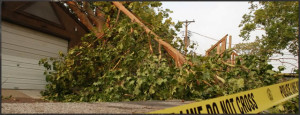 With the popularity of the forensic sciences on the rise, you may be interested in learning more about forensic meteorology. Unlike some of the other forensic sciences, forensic meteorology is less concerned with utilizing scientific research in the solving of crimes than it is with utilizing such research to help settle property loss and insurance claims.
With the popularity of the forensic sciences on the rise, you may be interested in learning more about forensic meteorology. Unlike some of the other forensic sciences, forensic meteorology is less concerned with utilizing scientific research in the solving of crimes than it is with utilizing such research to help settle property loss and insurance claims.
Weather Detectives
Essentially, a forensic meteorologist is a kind of weather detective. They reconstruct events related to weather, often providing consulting and expert witness testimony to legal firms and insurance companies, according to itsGOV’s website. The job of this kind of “weather detective” is to help provide information regarding the specific role that weather (cold, snow, wind, rain or other types) may have played in a fire or accident that has caused damage to people or property. Sometimes accidents such as these have legal and insurance repercussions, and the forensic meteorologist is called upon to give their insights in court or in other settings.
Forensic meteorology requires the use of many different kinds of tools and instruments in addition to solid reasoning in math and science. Someone working in the field will likely make use of satellite images, computer weather modeling and various eyewitness reports as they reconstruct a timeline surrounding a weather event. A forensic meteorologist will often be called to a scene in the wake of a major storm or weather catastrophe. When such a major storm hits, such as a hurricane, flood or tornado, sometimes local weather stations aren’t able to function, which is when a meteorologist must rely more on modeling and prediction skills. In addition to being present after major events, the skills of forensic meteorology might be useful in determining the cause of an accident involving ice or lightning hazards.
Becoming a Forensic Meteorologist
A forensic meteorologist must have a firm grounding in atmospheric science. There are bachelors degrees in the field, though many people who go on to study meteorology at the graduate level begin with a bachelors in a related field such as geoscience, physics, chemistry or math. Really any of those fields would be a useful preparation for becoming a meteorologist, and will likely be studied at advanced levels in an atmospheric science degree. Computer programming is another important skill in this field. One of the more important resources for professional development in the field is the American Meteorological Society, whose career center offers plenty of information about different careers in meteorology as well as insight into some of the settings where meteorologists may apply their knowledge and skills, including private companies, government offices or universities.
Related Resource: Meteorology Internships
If you have a curiosity about the way weather works and a desire to use science and math knowledge to help people in the real world solve weather-related mysteries, you might want to learn more about this interesting field of study. Like many other types of forensic science, forensic meteorology involves observation, data gathering and the applying of information in ways that can help others answer difficult questions that need answers.